95% of real estate companies have property listings online, according to statistics.
When compared to competitors, constructing a website is a small step. To stay ahead in real estate, you need a specialized mobile app. A real estate app must standout out in crowded app stores to be downloaded.
What’s a “great” real estate app? What distinguishes your app? Before we address these questions, let’s examine why your real estate firm needs a mobile app.
Why Real Estate App Development Is a Trend
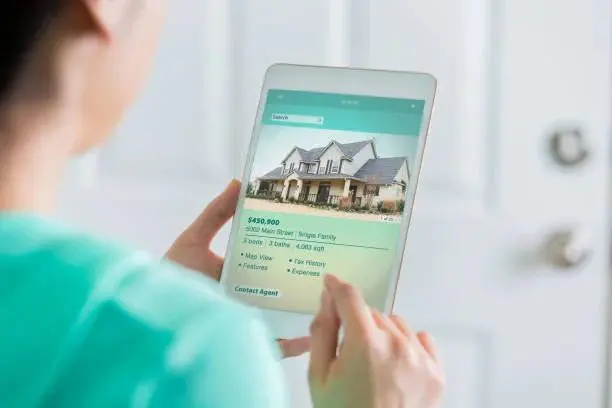
Real estate is highly digitalized. Homebuyers no longer move from one real estate agent to another. People may quickly view homes on their phones.
In 2020, U.S. real estate technology transactions topped $7 billion. Zillow is now the most popular property and rental listing website. According to Statista. It had more than 36 million monthly visits, which is remarkable.
The real estate sector is changing at a rapid rate. In October 2021, new purchases will be stopped.
In a fast-growing market, mistakes can’t be made. If you don’t meet every customer’s needs, you’ll lose. A smartphone real estate app might also be used against competitors.
24/7 In-App Channel for Communication
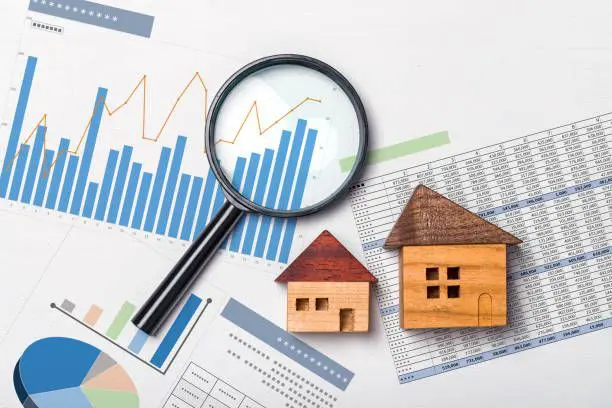
A communication channel within an app available around the clock and seven days a week makes it possible to have instant chats and reduces the time spent waiting.
Automation Of Repetitive Duties
It will be possible for agents to delegate the majority of the time-consuming duties that are currently under their purview. The details on the property may be auto-filled, and chatbots can promptly reply to prospective customers to create leads.

Homebuyers are another group that stands to profit from automation since it makes it possible to rapidly get paperwork, make bids, and be alerted about new properties that meet their criteria.
A More Rapid Sales Process
Real estate agents may expedite the sales process by utilizing a real estate software platform specifically tailored to their needs. Rental lookup app development might benefit from virtual tours, reducing the need for long showings; paperwork could be signed and sent digitally, and properties could be located more rapidly.

An Enhanced Customer Experience
Creating the perfect customer experience is the key to success in today’s market. How you interact with customers and how well you understand their needs will determine whether they come back to you repeatedly.

By creating an online presence that meets these needs, you can create an enhanced customer experience that will keep them coming back time after time!
Also read: A Detailed Guide to the Types of Software in 2022
Analysis Of The Real Estate Market
Market research must be the first thing you do if you want your real estate app to live up to your expectations. Even though you have spent years working in this field and believe you know everything there is to know about it. It would help if you didn’t let your preconceived notions be why your idea fails in its early stages.
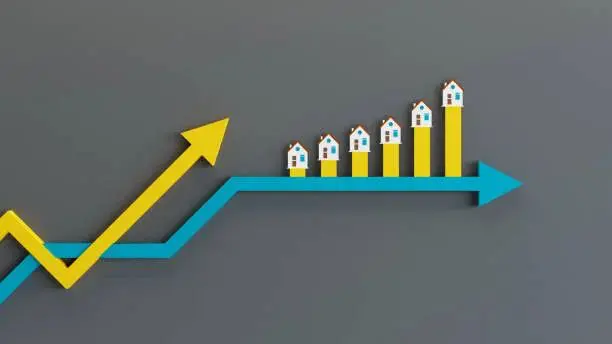
Digital background depicting innovative technologies in business, growth, and development real estate business and Internet technologies
Your preliminary market research should be able to supply you with current and, at times, surprising information on the following topics:
- The capacity of a mobile real estate application to fulfill your anticipated financial gains.
- A reliable portion of the market share
- The most recent developments made by competitors and the prices required to attract customers from competitors
- Real estate industry developments on the cutting edge of technology
- Statistics and data about the industry to help you forecast your return on investment, and more
For instance, while we were conducting research on the industry in South Africa before establishing the rental platform Rentorr, we discovered some fascinating aspects. In a nutshell, it was essential to equip the platform with a tenant verification system supported by bank APIs to satisfy the requirements of landlords and remain competitive.
If you run a business that deals in real estate, you almost certainly have a blog, a Channel on youtube, and maybe a social media profile that your customers can use to locate you quickly. If you don’t have one, you should get one.
However, suppose you have a smartphone application. In that case, you can boost the likelihood that potential purchasers of homes will see your listings, make users twice as devoted to your company, and assist your agents in getting closer to their clients.
Using a mobile app, you can stay up with the latest digital developments within the real estate sector and attract significant investments. Both of these things are possible.
Real Estate App Concept
A bespoke app for the real estate industry may carry out various tasks and serve several roles. Consequently, before developing an app for the real estate industry, you should determine your app’s category, function, and characteristics.
1) Property Listing
Clients of property listing applications are provided with homes and apartments currently for sale in the local area. Generally, they go through the basic details concerning every real estate item. The construction of a property app may be an incredible concept that nets a healthy return for the app’s owner.
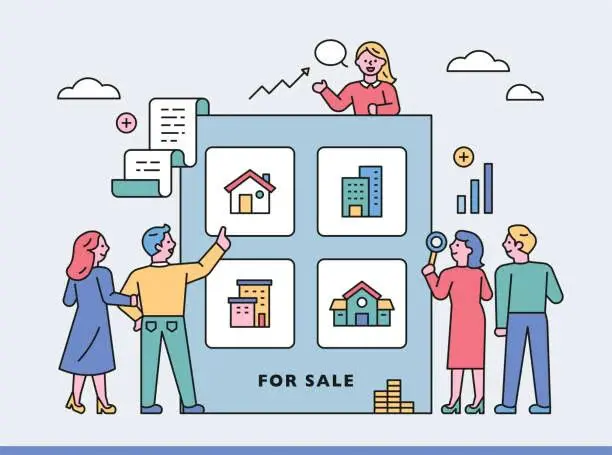
2) Apps for Realtors
Most of the time, specialized applications designed for real estate agents cover all fundamental elements that facilitate customer communication. They not only provide access to the real estate papers but also cut the paperwork.
3) Property Management
Such real estate software applications help property managers monitor their properties. The software shows maintenance requests, rent due dates, and company metrics.
Proper is a property management software we built. It simplifies landlord-tenant third-party contractor relationships.
4) Smart Home Management
The purpose of these applications is to locate homes and flats that include innovative home technologies. This is among the trends that Millenials are demanding the most attention. It is the management software for smart homes, like controlling house functions with the help of an app like curtains, lighting, etc.

13 Features Every Real Estate App Should Have
It is vital to analyze the app’s intended users before deciding what features should be included in developing a real estate app. Analyzing functionality is also a very important step. Having stated that, let’s talk a little more about some features.
Additional reading: MoSCoW Method: How to Maximize Prioritization in Development
To a large extent, all real estate apps can be directed toward either clients or agents.
1) Login/Sign Up
Onboarding is among the most fundamental components of real estate software, and it must be kept as straightforward and uncomplicated as possible. There are three different approaches to take here:
- Social media authorization
- Verification and authorization by email and phone calls
To enable customers to join your app, you can select any of the aforementioned techniques as your preferred option. However, an even better strategy could be to combine all of the aforementioned possibilities. The sign-up procedure will become even less complicated, and the users will benefit from more convenience and flexibility.
2) Push Notifications
Marketing push alerts are very effective in increasing business. Long-term success in real estate requires this attribute.
Push alerts help you retain customers. It promotes your services effectively. You may give prospects push alerts with industry news. You may inform users when prices change or perhaps a new property is introduced.
Personalizing push alerts maximizes their value. Only send end-users relevant communications.
3) Personal Profiles
The application should allow users to establish profiles for different activities. Different user profiles should exist.
The buyer’s profile will have different options than the agent’s. A buyer may view house listings, save favorites, examine detailed listings, etc. We’ll discuss it later. An agent may access his listings, timetables, list of prospective buyers, listing views, promotional choices, etc.
Common factors exist. Users can access maps and messaging.
4) Administrative Panel
The application should allow users to establish profiles for different activities. Different user profiles should exist.
The buyer’s profile will have different options than the agent’s. A buyer may view house listings, save favorites, examine detailed listings, etc. We’ll discuss it later. An agent may access his listings, timetables, list of prospective buyers, listing views, promotional choices, etc.
Common factors exist. Users can access maps and messaging.
5) Street View and Navigation
Users may obtain a more comprehensive understanding of the region, much like what they would get from a map. Interested parties can get a feel for the area without physically visiting by using an API from Google Maps.
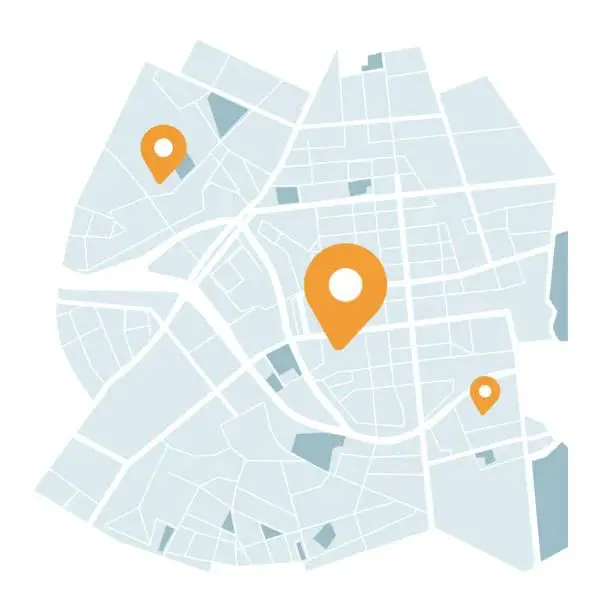
There may also be certain elements that are shared. All of the users can use the functions, which may include mapping and messaging.
6) Listings and Database
A real estate app lists properties. Listings must provide a complete list of available properties.
Listings for rent or sale should be easy to add.
Property listings will expand. Thus, you’ll need a vast database. Future users and listings will increase, ensuring the database and servers can grow. Real estate apps need a robust database.
7) Categories and Filters
Another option that might assist in making the search process more manageable is using categories and filters. When designing an app for the real estate industry, it is imperative that you first determine which features will be most in demand among your customers and then incorporate those features into the app’s many categories and filters.
8) Mortgage and Property Calculators
Your real estate app can benefit from pricing calculators. You should ask developers to implement a custom cost-estimating option for consumers.
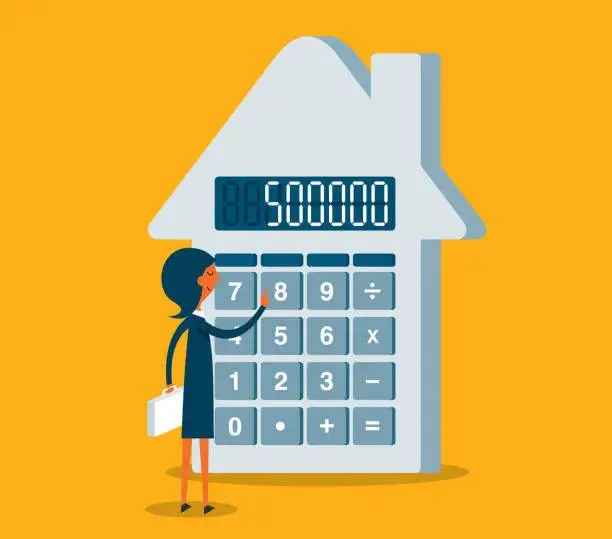
Check the calculator’s accuracy. It should estimate the total cost based on beginning payment ranges, taxes, loan interest, and payback timeline.
9) Call and Direct Messaging
One component is ensuring users have access to the detailed property information. You must advance the users to the next step of the sales funnel by integrating the ability to make phone calls or send direct messages.
Connecting buyers and brokers may be accomplished through a variety of methods, including the following:
- Direct calling
- Option for a callback
- In-app chat
- Make an appointment for a meeting.
Suppose a potential purchaser is interested in a particular piece of real estate. In that case, they should be able to get in touch with the property’s dealer or owner to obtain further information.
10) Virtual Tour
Home postings that include virtual tours garner greater interest from prospective buyers. It offers a complete view and design of the property, offering a correct perspective and knowledge of the property, which descriptions may not always succeed in doing.
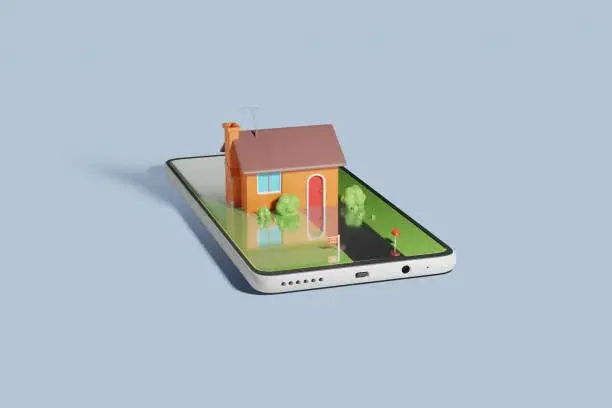
A stylized cartoon house for sale rising from a mobile phone. Concept of modern real estate. Buying and selling homes online. 3D rendering.
11) Calendar
Using the straightforward calendar function, purchasers and their brokers may arrange viewings and appointments with one another. They can check the calendar for open days and make reservations using the app.
12) Analytics
Mobile app analytics is essential.
You should know how end-users are engaging with your app, whether you’re creating a real estate market or a business app.

Analytics shows how the app functions and what to do to enhance it. You may receive information on users’ in-app activity, such as screen time. This data helps you choose apps.
To maximize data, segment users based on behavior and add them to marketing campaigns.
13) Chatbot
Customers may obtain instant answers to their questions whenever they need them by using a chatbot in conjunction with online chat. Users will get further knowledge about a subject area without having to seek it within the program manually, and frequently asked queries will have their solutions automatically generated.
Best Design Practices for Real Estate App
As was just discussed, the market for real estate applications is increasing. Therefore, you must adhere to several current trends and industry standards for best practices to provide your consumers with a positive experience when using your product or service.
1) Simplify the Customer Experience
Real estate app customers expect to find a home quickly. Include filters and accessible navigation forms in your app.
Any real estate software needs neighborhood information. You must guarantee that your application’s consumers can quickly obtain this information. The object’s description can include a map view, and a map view can also be added to the navigation panel.
2) Create a Multi-Page App
Create an app with several pages if you want to attract more attention. They are much more effective for optimizing search engine results in SEO. It is also simpler to integrate advanced analytics and conduct analyses of the web pages and information necessary for further improvement.
3) Focus on Superior Engagement
A consumer needs information about an apartment or house using a mobile app. Photos and movies aren’t enough. Modern trends provide dynamic and practical solutions.
Using AR and VR may provide your consumers with a fresh experience of seeing an object offline.
Also read: How to Create a Product Roadmap in 2022?
Benefits of Real Estate Apps
Numerous property purchasers flock to user-friendly and inventive applications to find a home. Many real estate agents offer innovative apps to help consumers and enhance income. Let’s describe some benefits of it:
Numerous property purchasers flock to user-friendly and inventive applications to find a home. Many real estate agents offer innovative apps to help consumers and enhance income. Let’s describe some benefits of it:
- Increases customer traffic for your listings.
- Better user navigation and accessibility.
- Highly interactive UI/UX increases your customer base when people quickly check the properties from their phones.
- Real-time push notifications attract more people to your listings instead of the older ways of marketing.
- Target more customers accurately over a shorter period.
- Increased communication.
- It helps reduce everyday running costs.
- Increased sales with better customer retention in the longer run.
- More user recommendations with increased customers.
Real Estate Mobile App Development Challenges
When creating real estate applications, expect roadblocks. We’ve outlined potential problems to help you find answers.
1) Expensive Development
More complicated features in a mobile app development project mean more costs. To effectively serve your target audience, you need 3D tours, property and loan calculators, keyless access systems, etc. In this situation, use the soft launch model. Not the only approach to cutting real estate app development expenses.
Contact our company development consultant to decrease app development expenses while maintaining quality.
2) Too Competitive
We’ve noted the competitive nature of the real estate market. With a mobile app, you won’t be unique. Focusing on consumer demands can help you compete with the competition. With the support of a team that uses the learn-build-iterate method, you can make your real estate app a global brand.
3) Insufficient Skills
By compiling the real estate app project system requirements, you may specify the experts and their required talents. What should you do if your team lacks hard skills? Outsource apps to developers like ENOU Labs.
4) Very High-Security Standards
When you design a property listing app, you must store sensitive information such as user profiles and real estate brokers’ current transactions. Your app development team must be secure.
Technology Stack Needed for the Development of Property Search Apps
To construct your real estate application, you will need a robust backend. The following is a list of helpful tools that may be utilized in the process of developing real estate applications:
- CoreData or Realm frameworks handle a list of attributes that have been stored.
- The Google Places API gives consumers information about the neighborhood they are in and the surrounding area.
- Push notifications may be included in Firebase SDK and the Apple Push Notifications Service.
- MLS data flows may be normalized using SimpleRets, iHomeFinder, and Spark APIs.
- The Facebook Software Development Kit (SDK) has a sign-in option for Facebook.
- The Zillow Application Programming Interface (API) grants access to the neighborhood information and listing data maintained by Zillow.
- Mapbox or the Google Maps API may be used to create personalized maps.
- The Onboard Informatics Community’s Spatial Neighborhood APIs make demographic data and other information on specific districts available to users.
- Java or Kotlin – developing language for Android.
- The programming language for iOS development is either Swift or Objective C.
- Online storage for listings provided by Amazon S3.
The business specializing in developing real estate apps will, as a general rule, assume full responsibility for the technological aspects of the project.
Also read: What Does “No Code Movement” Mean For A Software Developer?
Cost of Real Estate App Development
Now that you understand why your company should engage in developing apps, you may be curious about the price tag associated with doing so.
What does it cost to create a mobile app for the real estate industry? Several different aspects determine the price of developing an app. The following variables can have a significant impact on the overall cost of developing a real estate app:
The region of the development business is a significant factor that influences the hourly rates. For instance, the hourly rates charged by businesses in North America often range from $150 to $250; however, in Eastern Europe, you may discover numerous possibilities that are within your price range, like $ 50 to $ 100 per hour.
You can always outsource to a company like ENOU Labs that can make your app for $ 15,000 to $ 30,000, whereas an American company will charge you at least $ 25,000 to $ 50,000. Despite the big difference in cost, both developments are at par with each other.
Examples of Successful Real Estate Apps
Purchasing a property is expensive. People spending six figures expect a dependable, feature-rich portal to check property details.
You can give extensive property insights and boost trust by including the aforementioned capabilities in your app.
Here’s a list of the most successful US real estate applications that revolutionized the business by offering innovative services to purchasers, sellers, and agents.
Develop Your App with Hapy
Mobile apps made buying and renting a new house more accessible. These apps help agents, brokers, and customers. As more purchasers utilize internet searches, a professional real estate app may be successful. In our essay on building a real estate app, we explained this.
Hapy will ensure that you are ready to enter the market and stay there with a superior app by the time we are done with you. We’ll help you realize your real estate business’ digital potential. Contact us for a free consultation!
FAQs
What Do Real Estate Apps Do?
Apps designed specifically for the real estate industry can assist real estate agents in a variety of tasks, including but not limited to: the generation of leads, the management of listings and closings, the tracking of expenses and open houses, the optimization of marketing campaigns, and the simplification of transaction management.
How Do Real Estate Apps Make Money?
Earning money with real estate applications in this manner is the most intriguing and frequent way to do so. Commission refers to the sum of money paid to a third party following the conclusion of a transaction between a seller and a buyer. Users have the option of signing up for a subscription on a monthly, quarterly, or annual basis.
Which Is the Best Real Estate App Development Company?
Hapy provides one of the best real estate app development services available, which enables the link of all parties in the real estate transaction, including buyers, sellers, and real estate agents, with a single tap or swipe on their mobile devices.




